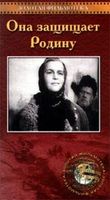 Ona Zashchishchayet Rodinu Ona Zashchishchayet Rodinu
1943, director: Friedrich Ermler
Сast:
-
Vera Maretskaya
-
Nikolai Bogolyubov
-
Pyotr Alejnikov
-
Lidiya Smirnova
-
Inna Fyodorova
-
Ivan Pelttser
-
Yu. Korshun
-
Kirill Chepurnov
-
Yevgeni Nemchenko
-
I. Medvedko
-
Georgi Semyonov
-
Boris Dmokhovsky
-
V. Gremin
-
Aleksandr Violinov
As the Nazi forces advance on Moscow, village woman, after witnessing her husband killed in combat, her toddler run over by a German tank, and her village commandeered by Nazi forces, organizes the surviving locals into a guerilla band bent on revenge.
Praskovya's husband and her baby son are killed by the Nazis in the beginning of WWII. She becomes the leader of popular uprising of partisans against the Nazi occupants. One day she is seized by the Nazis and is prepared for a public execution. At the last moment her fellow partisans come to save her life.
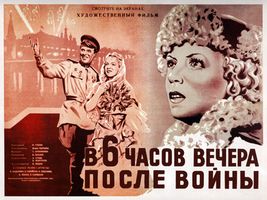 V shest chasov vechera posle voyny V shest chasov vechera posle voyny
1944, director — Ivan Pyryev
Сast:
-
Yevgeni Samojlov - Lieutenant Vasili Ivanovich Kudryashev
-
Marina Ladynina - Varya Pankova
-
Ivan Lyubeznov - Lieutenant Pavel Demidov
-
Anastasiya Lysak - Fekla, aka Fenya
-
Yelena Savitskaya Ekaterina "Aunt Katya" Mikhailovna
-
Aleksandr Antonov
-
Lyudmila Semyonova
-
Tikhon Khrennikov
Designed as a successor to "They Met In Moscow", with the same director, star and composer, "Six P. M." (1946 American release title) has two artillery officers meeting an attractive girl in Moscow between battles. One falls in love with her and they vow to meet in Moscow on a bridge at Six P.M. when the war ends. The war puts them on diverse trails, but the pledge is fulfilled against a setting of Moscow's famous fireworks displays.
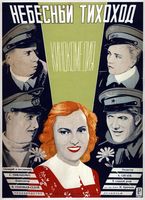 Nebesnyy tikhokhod Nebesnyy tikhokhod
1945, director — Semyon Timoshenko
Сast:
-
Nikolai Kryuchkov - Major Bulochkin
-
Vasili Merkuryev - Lieutenant Tucha
-
Vasili Neshchiplenko - Captain Kaisarov
-
Alla Parfanyak - Reporter Valya
-
Lyudmila Glazova- Lieutenant Kutuzova
-
Tamara Alyoshina - Lieutenant Svetlova (as T. Aloyshina)
Film is set in the WWII in Russia. Three pilots are best friends and good fighters. They are taking an oath to refrain from love until the end of the War. But soon they meet three women-pilots. One by one they give up the oath, and all three fall in love.
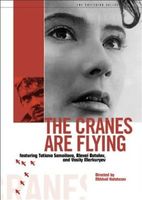 The Cranes are Flying The Cranes are Flying
1957, director: Mikhail Kalatozov
Сast:
-
Tatyana Samojlova - Veronika
-
Aleksey Batalov - Boris
-
Alexander Shvorin - Mark
-
Vasili Merkuryev - Fyodor Ivanovich
-
Antonina Bogdanova - Grandmother
-
Valentin Zubkov - Stepan
The film depicts a Soviet family of the professional class. The head of the family, Fyodor Ivanovich, is a doctor and lives with his son, Boris, and daughter, Irina. His mother and nephew Mark also live with the family. The film centers on Boris's girlfriend, Veronika, and her experiences in wartime.
The call to war sounds, and the country responds with great patriotic fervor. Boris volunteers to defend his homeland from the attackers, much to Veronika's sadness. He leaves for the war, and is killed under the birches (pod beryozonykoy) in a swamp, saving a fellow soldier. However, he is listed as missing in action and neither Veronika nor his family know that he has been killed.
The man that Boris died trying to save comes in search of Boris's family to tell them the news. When Veronika finds out, she refuses to believe it, saying Boris's friend Stepan, who volunteered with Boris, will know what happened to him. When the soldiers come back at a victory parade Veronika meets Stepan and she finds out that Boris is indeed dead. The film ends on a hopeful note when the war is over: Boris's friend Stepan makes a speech asserting that they will never forget those who died in the war, but peace must be maintained.
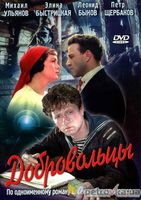 Volunteers Volunteers
1958, director: Yury Egorov
Сast:
-
Mikhail Ulianov — Kaitanov
-
Piotr Scherbakov — Ufimtsev
-
Leonid Bykov — Alyosha Akishin
-
Elina bystritskaya — Lela
-
Nonna Mordyukova
A romantic and heroic tale about young communists of 1930’s and the destiny of the generation which was building the Moscow underground, fought in the war and restored the country after the war.
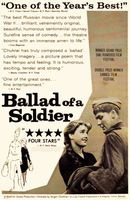 Ballad of a Soldier (Ballada o soldate) Ballad of a Soldier (Ballada o soldate)
1959, director: Grigory Chukhrai
Сast:
-
Ivashov Vladimir,
-
Prokhorenko Zhanna,
-
Maximova Antonina,
-
Kriuchkov Nikolai,
-
Urbansky Yevgheny
This film had a triumphant run over the world’s movie screens. The main hero is a Russian soldier, Alyosha Skvortsov, one of the many who made the victory over Fascism possible. He is neither an action movie hero, nor a conqueror. This simple boy, who was panic-stricken at the first sight of an enemy tank, overcomes his fear and manages to hit two enemy machines. However, battle scenes do not take much of the film’s time. For his fighting exploits Alyosha is awarded a two-day’s leave to visit his mother. He meets many different people on his way and is ready to help everybody. That leaves him just a few minutes to spend with his mother – a few words, a hug, and he is off for the front again… to never come back.
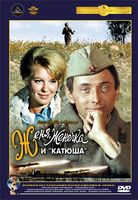 Zhenya, Zhenechka i 'Katyusha' Zhenya, Zhenechka i 'Katyusha'
1967, director — Vladimir Motyl
Сast:
-
Oleg Dal - Zhenya Kolyshkin
-
Galina Figlovskaya - Zhenechka Zemlyanikina
-
Mikhail Kokshenov - Zakhar
-
Pavel Morozenko - Aleksei Zyryanov
-
Georgi Shtil - Romadin
-
Mark Bernes - Colonel Karavayev
-
Adolf Ilyin - Divisional commander
-
V. Schneider
-
Vladimir Ilyin
-
Lyubov Malinovskaya
Karaev’s role was the last one in the movie of Mark Bernes.
In the story, Leutenant Romadin (Georgy Shtil) has a “headache” in the unit — a common soldier, Eugeny Kolyshkin (Oleg Dal), the Moscow intelligent. Zhenya Kolyshkin, who lives in the world of fantasy and read books, can not fit into the surrounding terrible reality. He constantly gets into funny situations: by chance he comes to the Germans in the New Year; then he is whelmed by a box in action. Finally, the most ridiculous thing he could do was to fall in love with the radio operator of “Katyusha” regiment — Zemlyanikina! After all, it is no secret what character she has! Although anything can happen in the war ... Zhenechka even ready to treat the fighter some tea secretly from the leadership. But hide and seek are not supposed to play in the war...
For 26-year-old Oleg Dal role of Zhenya Kolyshkin will be the first stepping stone to the top of the actor’s triumph. A little later, with the release of a new film, Chronicle of a dive bomber, he is to come to real success and recognition.
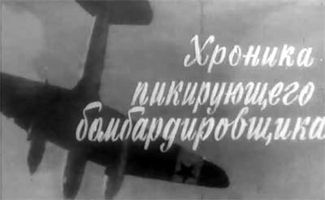 Khronika pikiruyushchego bombardirovshchika Khronika pikiruyushchego bombardirovshchika
1967, director — Naum Birman
Сast:
-
Gennadi Sajfulin - Sergei Arkhiptsev
-
Oleg Dal - Yevgeni Sobolevski
-
Lev Vajnshtejn - Veniamin Gurevich
-
Aleksandr Grave - Regimental Commander
-
Pyotr Shcherbakov - Chief-of-Staff
-
Georgi Korolchuk - Mitka Chervonenko (as G. Korolchuk)
-
Leonid Reutov - Pastukhov (as L. Reutov)
-
Nikolai Trofimov
The film based on the script by V. Kunin, is about the everyday tactical aircraft during the Great Patriotic War.
There is the Great Patriotic War, but the front-line bomber airfield is inactive — it is foggy, so the planes do not fly. Command sets the task to find and photograph an enemy airfield, where the Focke-Wulf fighters, very disturbing our aircraft, are based. The crew of a young but experienced Junior Lieutenant Chervonenko flies to the mission. Before leaving, from the report of the Soviet Information Bureau, he learns that his native town of Pinsk was liberated.
Creative and resourceful gunner-radio operator, Zhenya Sobolewsky (Oleg Dal) from the crew of Arkhiptsev (Gennady Saifulin) of raspberry juice brought by the Voentorg shop and hydraulic fluid from the aircraft prepares liquor “Chassis”. Crews celebrate the liberation of Pinsk, but here comes the news that Chervonenko lands across the start. Chervonenko died, his navigator landed the plane (Leonid Reutov). Chervonenko had time to photograph the enemy airfield, but it was false. In the evening, in the dining room, the captain of medical service (Gely Sysoev) verbally abuses his navigator’s girlfriend (Leo Weinstein), the commander and navigator, throw him out of the dining room, and in turn he threatens to write a report. Arkhiptsev’s crew in full force are put in the guardhouse, the commander and navigator for the fact that they “stroke deputy chief in the face” and the gunner — for making “liquor”.
Command once again decides to explore the airfield; for that Akrhiptsev’s experienced crew is best suited, and they are early released from the guardhouse. During the first flight Akrhiptsev also detects a false airfield, and again the bomber is attacked by a few fighters. Sobolewsky knocks a fighter. The crew hardly beetles of the prosecution of enemy fighters, simulated by a dive that they were shot down.
To achieve the task, it is needed to fly again. Arkhiptsev wants to test his hypothesis that the airstrip is located near the railway station. The entire regiment is waiting for messages from Arhiptsev about the coordinates of the airfield to take off for bombing it. Arhiptsev is looking for the airport, but again he is attacked from ambush airfields five enemy fighters. Arkhiptsev shot all ammo; Sobolewsky was killed. Fighters surrounded the plane and wanted to force him to land at their base. Seeing the enemy’s plan, along with the navigator Arkhiptsev decided to ram the fighters standing on the ground ...
The value of such films about the war, like the daily, mundane, modestly but with dignity, singing the praises of conventional military labor of often still quite young guys, I think, is increasing over the years. And decades later, this film of Naum Birman, founded by Vladimir Kunin’s scenario, is still alive and gets particular credibility of the story, because some of the actors are dead — as if they were killed in the war, even if it only happened on the screen. The truth of the daily existence of soldiers, air war workers, simply cannot do without the jokes that help to relieve stress and to avoid losing the infinite joy of life even under inhuman conditions.
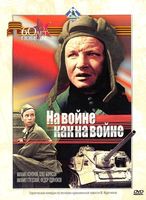 War is War War is War
1968, director: Victor Tregubovich
Сast:
-
Boris Arakelov — Cheginichka
-
Oleg Borisov — Mishka Domeshek
-
Peter Gorin — captain Sergachev
-
Mikhail Gluzsky — colonel Dey
-
Yury Dubrovin — Gromykhalo iz Podmyshki
-
Valentin Zubkov — regiment commander
-
German Kolushkin — Pashka Telenkov
-
Mikhail Kononov — junior lieutenant Maleshkin
-
Peter Lyubeshkin — deputy commander for political affairs Timofei Vassilyevich
-
Fyodor Odinokov — Osip Byankin
-
Victor Pavlov — Grisha Sherbak
-
Boris Tabarovsky — new battalion commander
War is War is a feature film based on a same-name novel by Victor Kurochkin. The film depicts military days of the crew of the self-propelled gun in the end of the Great Patriotic War. Lieutenant junior Maleshkin, graduat of the military academy, takes under command an experienced crew of the self-propelled gun and is soon going to the first battle in this status.
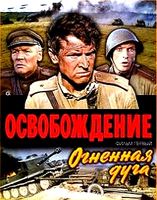 Osvobozhdenie (The Liberation) Osvobozhdenie (The Liberation)
1969—1972, director — Yury Ozerov
Сast:
-
Nikolay Olyalin - Tsvetayev
-
Larisa Golubkina - Zoya
-
Boris Zajdenberg - Orlov
-
Sergei Nikonenko - Sashka
-
Vsevolod Sanayev - Lukin
-
Vladimir Samojlov - Gromov
-
Jan Englert - Ppor. Jan 'Janek' Wolny
-
Mikhail Ulyanov - Marshall Georgy Konstantinovitch Zhukov
-
Bukhuti Zaqariadze - Josef Stalin
-
Fritz Diez - Adolf Hitler (as Fritz Dietz)
-
Gerd Michael Henneberg - General Wilhelm Keitel (as G.M. Henneberg)
-
Hannjo Hasse - Hans Gunther von Kluge
-
Peter Sturm - General Alfred Jodl
-
Florin Piersic - Skorzeny
-
Barbara Brylska - Helena
The screenplay was written by two well-known writers — Oscar Kurganov (historical scenes), and Yury Bondarev (“trench” episodes with Tsvetaev, Orlov, Lukin and other characters). Direct supervision of the crew was carried out by the Central Committee of the Communist Party of the Soviet Union.
The creation of such epic gave rise to huge budget. Director claimed for the maximum authenticity (for example, Stalin’s uniform was sewed by the author of the real Stalinist uniforms). When neither in the USSR nor in the GDR the needed amount of “Tiger” and “Ferdinand” tanks for the first film was found, it was ordered to make them in the Lvov Metallurgical Factory. There were manufactured 10 “Tigers” and 8 “Panthers”. Defense Minister, Marshal Malinovsky added another hundred of domestic cars, which were repainted by the German and shot in the background. All in all, the film was attended by over 150 tanks. There had also been made some aircraft.
The shooting was almost like the real battle. Staffs were outfitted, communication was laid, helicopters flew round (one of which was constantly directed). Linking of all the armed forces during the battle is not an easy task, but it was solved. A total of shootings involved more than 3,000 soldiers.
By 1968, the first epic film, Fire Arc, was completed. By the summer of 1969, the director also finished the second film (“Breakthrough”). Both tapes were released simultaneously and were displayed on a single session. In late 1970 — early 1971, their third film — “The direction of the main attack” (in two parts) was released. And at the end of 1971 — the final two films. “Battle for Berlin” and “The last storm”. In 2002, the tape was completely renovated in Mosfilm studio.
Film One – “Fire Arc”, 1969
The film tells about the battle of Kursk in July 1943. The shooting took place in the vicinity of Pereslavl-Zalessky. Shooting permit on the site of the real events was not obtained, although the group traveled to Kursk. The problem was that the place of past battles contained a large number of unexploded bombs and shells that could detonate at any time during the fireworks effects.
Film Two – “Breakthrough”, 1969
Liberation of Orel and Belgorod. Abandonment of Kharkov by the Germans. The crossing of the Dnieper is ahead. The real fact of creating a false bridgehead on the left bank, in order to pull on it large German forces. The bridgehead was completely surrounded, and most of its defenders died. Only a few managed to break through the encirclement and reach the main crossing of the Soviet troops. The list included the authors and their characters — Tsvetaev and Orlov. At the same time, Benito Mussolini, was arrested in a plot of Marshal Badoglio. By Hitler’s order, the dictator was released by a special group of Otto Skorzeny. The German troops crashed in Italy. The film ends with the Tehran Conference.
Film Three — “The direction of the main attack”, 1969
The story of the decisive and dramatic events of 1944, about the Belarusian offensive operation (“Bagration”) and the complete liberation of the Soviet territory. In early June, the Allies landed in Normandy. Despite the fact that a German agent “Cicero” has managed to steal the documents about the opening of the second front, the Germans were unable to prevent landing. Failures on the fronts give birth to the conspiracy of generals to kill Hitler, and to conclude separate peace with the Western Allies. On July 20, assassination attempt fails. Conspiracy is uncovered and a rebellion is suppressed. Military shooting took place there, where the two previous films — at the designated area near Pereslavl-Zalessky.
Film Four — “The Battle for Berlin”, 1971
The main battle on the outskirts of the German capital. The assault of the Seelow Heights. The Yalta Conference. By Hitler’s order, Himmler sends the Chief of the SS Staff, Obergruppenführer Karl Wolf in Bern, to negotiate with Allen Dulles.
Film Five — “The last storm”, 1971
The last film in the epic. It was watched by most viewers, since for years it was shown on CT every Victory Day, on May 9. Unlike in previous tapes, the fifth film was shot directly in the capital of the GDR.
A shooting train arrived there. At that time the reconstruction of one of the central districts began. All the old houses were planned for demolition, to be replaced by modern buildings, so it was easy given for shooting. It was possible to explode and destroy everything without any restrictions there. Storming the Reichstag was filmed in parts. In Berlin, was found a crumbling cathedral facade and grand staircase of which was very reminiscent of the Reichstag. Fighting inside the building was shot, of course, at Mosfilm. A shootout in the air — also in the Berlin House of technology.
A special place in the film takes an episode with flooding the subway (Hitler ordered to open the gates and blow the Spree waters down the subway, to prevent the passage of Soviet troops through it). This shooting took place near Moscow. At one of the locks of the Moscow River was built the Berlin underground scenery, where the real German coaches were brought. Flooding of “metro” occurred as a result of the opening of the gateway.
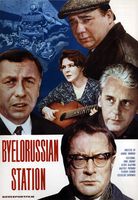 Belorussian Station Belorussian Station
1970, director: Andrei Smirnov
Сast:
-
Evgeny Leonov — Ivan Prihodko
-
Anatoly Papanov — Nikolai Ivanovich Dubinsky
-
Vsevolod Safonov — Alexei Konstantinovich Kiryushin
-
Alexey Glazyrin — Victor Sergeyevich Kharlamov
-
Nina Urgant — Raisa
-
Lyubov Sokolova — Lyuba, Prikhodko’s wife
-
Nikolai Volkov, jr. — chief of Dubinsky
-
Margarita Terekhova — Natalia Shipilova
-
Alexander Yanvarev — driver Sasha
-
Raisa Kurkina — widow Lida Matveyeva
-
Yury Volyntsev — militia top sergeant
Former fellow-soldiers, and now journalist, accountant, plant director and common mechanic who parted in spring 1945 at the Belorussian station gather together again to pay last respects to their fellow, guard colonel Valentin Matveyev. They take a wander along Moscow. Despite 25 years which passed from the end of the war they are still faithful to their friendship. In the end they gather at former medical sister.
As a result of many unexpected twists of the plot they have to check their friendship in various situations.
A famous song "We shall pay any price for the victory" ("All we need is victory") was written by Bulat Okudzhava specially for the film.
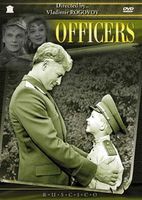 Officers (Ofitsery) Officers (Ofitsery)
1971, director: Vladimir Rogovoy
Сast:
-
Georgy Yumatov,
-
Vassily Lanovoy,
-
Alina Pokrovskaya,
-
Andrei Anisimov,
-
Alexander Voyevodin,
-
Natalya Rychagova,
-
Vladimir Druzhnikov
One of the most popular and favourite films in Russia. The film follows at length the lives of two friends – Alexei Trofimov and Ivan Varrava. In the 1920s they served together at a frontier outpost, fighting with the basmachs. It was there that the young men first heard, and remembered for the rest of their lives, their commander’s behest: “There is such a profession – defending one’s Motherland”. Then followed Spain, the Great Patriotic War, and peaceful time. The old friends reunite when they are already in the rank of generals.
The song “Eternal flame” (“The heroes of the bygone years…”) was recorded by Vladimir Zlatoustovsky (second director), lyrics by Evgeny Agranovich, music by Rafail Khozak.
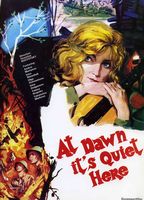 At Dawn It`s Quiet Here At Dawn It`s Quiet Here
1972, director — Sergey Rostotsky
Сast:
-
Andrei Martynov — senior sergeant Fedot Vaskov
-
Olga Ostroumova — Zhenya Komelkova
-
Irina Shevchuk — Rita Osyanina
-
Elena Drapeko — Lisa Brichkina
-
Ekaterina Markova — Galina Chetvertak
-
Irina Dolganova — Sonya Gurvich
The film has become the classics of Soviet cinema and one of the most favourite movies about the war.The movie was one of the box-office hits of 1973, and was watched by 66 million people. In 2002 the reviews acknowledged it as the most popular film about the Great Patriotic War in Russia.
The film is set in Karelia (North-West of Russia near Finland) in 1941 during WWII and was filmed near Ruskeala. In a railway station far from the front line, senior sergeant Vaskov is stationed with a group of young female anti-aircraft gunners. Vaskov is not used to these gunners' active, playful personality and therefore clashes with them over daily issues. But Vaskov, being the only man in the village, has to accommodate for them in many cases.
One day, two German paratroopers appear in the forest near their garrison. Thinking that the paratroopers may sabotage military facilities, Vaskov and five female gunners leave the station and attempt to stop the Germans in the forest. They pick up a perfect defense position, only to find that there are sixteen paratroopers instead of two. Though outgunned and outnumbered, Vaskov decides to hold the Germans for as long as possible. He also sends a soldier back to the garrison to ask for reinforcement. However, that girl is drowned in the swamp on her way. Vaskov and the remaining four soldiers fight the Germans in the forest, and all four girls are killed in action. Vaskov is also heavily wounded and finds the drowned soldier's clothes near the swamp. The desperate Vaskov attacks the cabin where the Germans rest. The Germans are totally surprised and are either killed or captured. Meanwhile, a reinforcement team departs the garrison to search for Vaskov and his group. The team finally finds Vaskov before he passes out.
 Hot Snow Hot Snow
1972, director: Gavriil Yegiazarov
Сast:
-
Alexander Arjilovsky — Golovanov
-
Ara Babajanyan — Davlatyan
-
Bolot Beishenaliyev — Kasymov
-
Vladlen Biryukov — Skorik
-
Alexander Voyevodin — junior lieutenant Belenky
-
Valentin Grachyov — Nechayev
-
Nikolai Yeryomenko jr. — Drozdovsky
-
Georgy Zhenov — Bessonov
-
Lev Zolotukhin — general Yatsenko
-
Alexander Kavalerov — Sergunenkov
-
Gennady Korolkov — Arzhemachev
The film focuses on one of the episodes of a heroic battle against the fascists nearby Stalingrad where the Soviet soldiers were able to show their firmness and strength of mind.
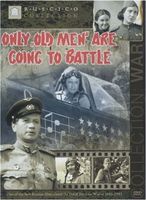 Only “Old Men” Are Going to Battle (V boy idut odni stariki) Only “Old Men” Are Going to Battle (V boy idut odni stariki)
1973, director: Leonid Bykov
Сast:
-
Leonid Bykov — Alexei Titarenko (“Maestro”)
-
Sergey Podgorny — Victor Schedronov (Smuglyanka)
-
Sergey Ivanov — Alexandrov (“Grasshopper”)
-
Evgeniya Simonova — Masha
-
Olga Mateshko — Zoya
-
Alexei Smirnov — Makarych
-
Rustam Sagdullayev — “Romeo”
-
Vladimir Talashko — Sergey Skvortsov
-
Victor Miroshnichenko — group commander
-
Grigory Gladiy — technician Alexandrov
-
Vladimir Volkov — deputy commander for political affairs
-
Yury Sarantsev — Vassily Vassiliyevich, division commander
-
Dmitry Mirgorodsky — infantry battalion commander
-
Alexander Milyutin — pilot “Try to scare him!”
-
Alexey Krychenkov — young pilot
-
Ivan Bondar
-
Valentin Grudinin — army reconnaissance chief
-
Vilory Paschenko — Vorobyov
-
Valentin Makarov
-
Vano Yantbelidze — Vano
-
Boris Boldyrevsky — chief of the regimental staff
-
Alexander Nemchenko — Ivan Fyodorovich
-
Alim Fedorinsky — Alyabiev
The USSR State Committee for Cinematography suppressed the film release motivating it by the fact that it is not actually the film about the War. However, when the script was shown to the air Force Component Commander Alexander Pokryshkin, he put his resolution “This is the real war!” across the sheet of paper.
The film depicts the life and fight of the guard fighter aircraft regiment during the Great Patriotic War, mainly the second “singing” escadrille.
In 1967 Leonid Bykov was offered to direct the film about pilots by the script of Vladimir Kunin Chronicle of Dive Bomber. However, he insisted on inclusion of the song Smuglyanka in the film. The idea was turned down cold. His idea of the pilots singing Smuglyanka Bykov was expressed in the movie Only “Old Men” Are Going to Battle.
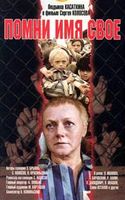 Remember your Name Remember your Name
1974, director — Sergey Kolosov
Сast:
-
Ludmila Kasatkina
-
Ludmila Ivanova
-
Lubov Sokolova
-
Pavel Vinnik
-
Vladislav Astakhov
-
Elena Chukhrai
The film is based on a real and dramatic story of a Russian mother parted from her son in Auschwitz. Having passed through all tortures of fascist hell she finally finds her son saved by a Polish woman.
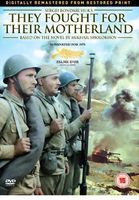 They Fought for Their Country They Fought for Their Country
1975, director — Sergey Bondarchuk
Сast:
-
Tatiana Bozhok — medical sister
-
Sergey Bondarchuk — Ivan Zvyagintsev
-
Georgy Burkov — Alexander Kopytovsky
-
Nikolai Volkov (junior) — common soldier Nikiforov
-
Nikolai Gubenko — lieutenant Goloschekov
-
Ivan Lapikov — senior sergeant Poprischenko
-
Petr Merkuriev
-
Nonna Mordyukova — Natalia Stepanovna
-
Boris Nikiforov
-
Yury Nikulin — common soldier Nekrasov
-
Andrei Rostotsky — private first class Kochetygov
-
Evgeny Samoilov
-
Gennady Safronov
-
Irina Skobtseva — medical sister
-
Innokenty Smoktunovsky — surgeon
-
Vyacheslav Tikhonov — Nikolai Streltsov
-
Vassily Shukshin — Piotr Fedotovich Lopakhin
-
Nikolai Shutko — cook Lisichenko
-
Lidia Fedoseyeva-Shukshina — Glasha
They Fought for their Country is based on the same-name novel by Mikhail Sholokhov. At the film festival of 1976 in Karlovy Vary the film was awarded with the trophy of the Czech Union of Anti-Fascist Fighters. It is the last film of a famous Russian actor Vassily Shukshin: he died during the filming.
The action is set in 1942 near Stalingrad where exhausted Soviet troops conduct hard defensive battles suffering numerous losses. The film depicts the feat of common soldiers, their love for the Motherland and true value of Victory.
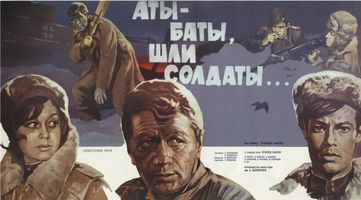 Aty-baty, shli soldaty... (One-two, soldiers were going…) Aty-baty, shli soldaty... (One-two, soldiers were going…)
1977, director — Leonid Bykov
Сast:
-
Leonid Bykov
-
Nikolai Grinko
-
Vladimir Konkin
-
Yelena Shanina
-
Leonid Bakshtayev
-
Yevgeniya Uralova
-
Ivan Gavrilyuk
-
Nikolai Sektimenko
-
Otabek Ganiyev
-
Natalya Naum
The last film by Leonid Bykov (“Maksim Perepelitsa”, “The Volunteers”), and his last film role. The tragic and the comic, the heroic and the lyrical - all has interwoven onscreen into an unusual story about the fathers remaining forever young and the children coming to the place where exactly thirty years ago their most dear ones took the last deadly battle…The first public performance of the famous song by Bulat Okudzhava and Valentin Levashov, “Take Your Greatcoat, Let’s Go Home”
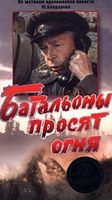 Batalyony prosyat ognya (Batallions Ask for Fire) Batalyony prosyat ognya (Batallions Ask for Fire)
1985, directors — Aleksandr Bogolyubov, Vladimir Chebotaryov
Сast:
-
Aleksandr Zbruyev - Capt. Boris Yermakov
-
Vadim Spiridonov - Col. Vladimir Iverzev
-
Oleg Yefremov - Col. Vasili Gulaev
-
Aleksandr Galibin - Lt. Seryozha Kondratyev
-
Yelena Popova - Nurse Shura
-
Igor Sklyar - Sgt. Zhora Vitkovsky
-
Gennadi Frolov - Col. Evgeni Alekseev
-
Vladimir Kashpur - Maj. Bulbanuk
-
Viktor Chebotaryov - Maj. Denisov
The film was shot to the 40th anniversary of Victory in the Great Patriotic War on the story by Yury Bondarev. It can be considered a remake of the 2nd series of the epic “Liberation” (“Breakthrough”) of 1969, as it was filmed on the same story and the plot is almost entirely repeated.
The basis of the story is an important stage in the Great Patriotic War, forcing the Dnieper River by the Soviet troops in summer-autumn campaign of 1943.
Two battalions have to cross the Dnieper, to create a springboard for further development of the offensive (the mission was set). In fact, the battalions had to chain the German units, and the main forces of the division to develop the offensive elsewhere. To support battalions, division artillery units were provided. That was the plan. However, before the onset the division was left without ammunition: through the rear leadership’s fault, the echelons were not unloaded for a short summer night, and the Germans bombed them. Command changed the plan of attack, leaving the battalion without fire support, thus condemning them to certain death.
|
